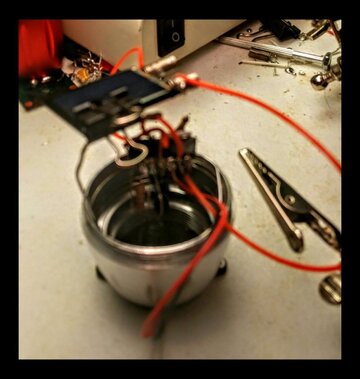... it seems that they are moving from the actual relationship to the mathematics and then not coming back, but instead looking for further relationships strictly in the mathematics ... we also do that ... we say if Eq1 says this and Eq2 says that ... then we should expect Eq3 ... but we then of looking for that and sometimes its confirmed and sometimes it isn't and then we go back and re-write Eq1 and Eq2 ... we don't expect reality to conform to the mathematics per se.
Isn't that 'expectation' a reaction to Godel's Incompleteness Theorums and others named in the wikipedia article that have recognized the limitations of our tendency toward formalist thinking based in reified concepts of that which is experienced? Kafatos attempts to move us beyond that tendency.
["
Gödel's incompleteness theorems are two
theorems of
mathematical logic that demonstrate the inherent limitations of every formal
axiomatic system containing basic
arithmetic.
[1] These results, published by
Kurt Gödel in 1931, are important both in mathematical logic and in the
philosophy of mathematics. The theorems are widely, but not universally, interpreted as showing that
Hilbert's program to find a complete and consistent set of
axioms for all
mathematics is impossible.
The first incompleteness theorem states that no
consistent system of axioms whose theorems can be listed by an
effective procedure (i.e., an
algorithm) is capable of proving all truths about the arithmetic of the
natural numbers. For any such formal system, there will always be statements about the natural numbers that are true, but that are unprovable within the system. The second incompleteness theorem, an extension of the first, shows that the system cannot demonstrate its own consistency.
Employing a
diagonal argument, Gödel's incompleteness theorems were the first of several closely related theorems on the limitations of formal systems. They were followed by
Tarski's undefinability theorem on the formal undefinability of truth, Church's proof that Hilbert's
Entscheidungsproblem is unsolvable, and Turing's theorem that there is no algorithm to solve the
halting problem."
Gödel's incompleteness theorems - Wikipedia]
Steve's post continues:
The point of an equation is not to have any qualitative content ... force equals mass times velocity squared applies to dancers and line backers equally ... but what it seems they do in this paper then is take E=MC(2) and make a series of moves from that. Thought experiments admittedly ...
I'm impressed to learn that Feynman broached the qualitativeness behind/beneath mathematical expression [where most mathematicians and physicists evidently have not]. From the paper Steve linked we can follow the notes to read more of what Feynman said on that occasion.
Thought experiments are apparently all we have to work with at this point, having come up against the incompleteness of our understanding in both physics and mathematics and also regarding the nature of consciousness. But the prospects for more comprehensive thought experiments undertaken by Kafatos and the author of the paper linked by
@Soupie are most promising. As often, Wallace Stevens provides a phrase that bubbles up for me from thirty years ago providing a sense of the scope of our inquiry at this point, in which we are sensing our approach to "the outlines of Being and its expressings."
@Soupie wrote in his first post today:
"If consciousness is fundamental and continuous (as we've been discussing), then we still need to understand how the structure of the organism/brain shapes consciousness into specific contents of consciousness. And if all processes are fundamentally conscious, why does it
seem that some processes are conscious and some are not?"
What we need to explore is the spectrum of evolution/increasing complexity of living organisms developed from original 'awareness' to
prereflective consciousness and the nature of
subconscious mind that arises within it, as the phenomenologists have been arguing.
I'll be reading with interest both the paper
@Soupie linked today and this additional Kafatos paper linked by Steve as soon as I finish reading the rest of the new posts in the thread today. It feels, to me, like we are now coming to the edge of a desert in our attempts to understand consciousness/mind and confronting an ontological mountain we will need to scale in order to understand more about the nature of 'reality'/what-is. It looks like there will five of us making the climb now that
@william has joined us and
@Pharoah has told me that he is rejoining the thread. Happy days.




